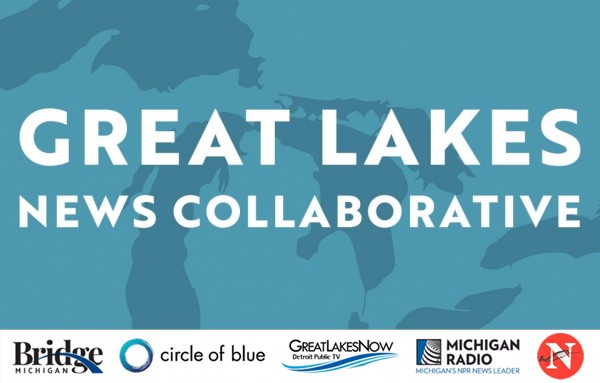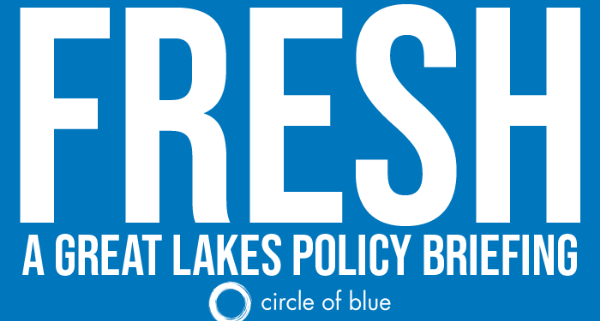Fresh, April 2, 2024: White House Announces $35 Million for Environmental Justice Projects Across Great Lakes
April 2, 2024
Fresh is a biweekly newsletter from Circle of Blue that unpacks the biggest international, state, and local policy news stories facing the Great Lakes region today. Sign up for Fresh: A Great Lakes Policy Briefing, straight to your inbox, every other Tuesday.
— Christian Thorsberg, Interim Fresh Editor
This Week’s Watersheds
- A new initiative is checking water quality in tribal schools, childcare centers, and after-school programs throughout the Great Lakes region, for free.
- The Biden administration announced a $35 million commitment for four projects supported by the EPA’s new Great Lakes Environmental Justice Grant Program.
- Currently receiving its water from groundwater wells, the town of Lake Zurich, Illinois, will commit some $150 million to switch its source to Lake Michigan.
- The discovery of invasive zebra mussels in Minnesota’s Red Lake, and the failure of the state to address their spread, accelerated the Red Lake Tribe’s push for tribal lands to be returned.
Construction on a $2.4 billion EV battery part plant has stalled near Big Rapids, Michigan, after the township rescinded its prior approval of water access for the factory.
“We might be a small community, but we refuse to be bullied.” — Jason Kruse, Green Township supervisor.
More than a year ago, Gotion Inc — a U.S.-based subsidiary of a Chinese-founded company that makes parts for electric vehicle batteries — announced it would be building a $2.4 billion factory in central Michigan. To operate, Gotion said, it would require 715,000 gallons of water per day. The local Green Township board adopted a resolution in October that offered Gotion two options to fulfill its needs: either extend the township’s own water line, or build a new water plant and well at the factory.
But a month later, facing pushback and anger from the public for this deal, each person on the seven-member board was either recalled or resigned, The Detroit News reports. A week later, the new board voted 4-3 to rescind the agreement. Last week, Gotion filed suit against the township in federal court, for breaching this original contract.
Per The Detroit News, the factory has been a contentious development in Green Township, with “the secrecy of the deal, the unknown environmental impact in a largely agricultural area, and the influence of China on the project” at the forefront of public outcry.
Fresh from the Great Lakes News Collaborative

- EPA Clean Up of Belanger Park Begins in April — Michigan Public
- Nibi Chronicles: The nation-to-nation fight against extractivism — Great Lakes Now
- For Michigan farmers, danger is another part of the job — Bridge Michigan
- A 94-year-old wants to welcome Ontarians to paradise. A parking lot nearly stood in her way — The Narwhal
Bridge Michigan, Circle of Blue, Great Lakes Now at Detroit Public Television, Michigan Public and The Narwhal work together to report on the most pressing threats to the Great Lakes region’s water. This independent journalism is supported by the Charles Stewart Mott Foundation. Find all the work here.

White House Commits $35 Million to Great Lakes Environmental Justice Grant Program
Four projects, each to support environmental justice initiatives throughout the Great Lakes, have been awarded a total of $35 million from the White House, the Environmental Protection Agency announced in a press release last week. The applicants were selected as part of the federal agency’s new Great Lakes Environmental Justice Grant Program.
“The climate crisis is having a real impact on our everyday lives, and we know that historically underserved communities are disproportionately hurt,” Michigan Rep. Debbie Dingell said in a written statement.
Restore America’s Estuaries will receive nearly $20 million to create a grant program of their own to support local partners throughout the entire region. The remaining $15 million will be split nearly equally between Buffalo Niagara Waterkeeper Inc, Ohio Lake Erie Commission, and Southeast Michigan Council of Governments. Among its many applications, the money will be used to address poorly constructed stormwater runoff systems, improve water quality, clean up polluted recreational and commercial waterways, and support Black and rural leaders’ restoration projects.
In the News
Lake Zurich: The northwest suburb of Chicago has begun the process of committing to a change in its water source — from its six aquifers, to Lake Michigan — and is willing to pay a steep price, the Lake and McHenry County Scanner reports. At $154 million, the transition will be the most expensive infrastructure project in the village’s history. Accordingly, rates will soar – increasing annually by $3 per 1,000 gallons until they reach $15 per 1,000 gallons in 2028.” But the transition is necessary. Not only are the aquifer’s supplies expected to deplete within 30 to 40 years, but their concentration of naturally occurring radium will no longer be in compliance with future EPA regulations.
In context: Chicago Suburbs, Running Out of Water, Will Tap Lake Michigan
Great Lakes Inter-Tribal Epidemiology Center (GLITEC): Based in Lac du Flambeau, Wisconsin, GLITEC is encouraging tribal schools, childcare centers, and after-school programs to check their water quality by offering free tests for PFAS, lead, and other heavy metals, WUWM 89.7 FM reports. The center even offers incentives of up to $1,500 for participating schools. After a few years of program development and outreach, GLITEC now serves 34 federally recognized tribes and four urban Indian communities in Wisconsin, Illinois, Michigan, and Minnesota. The program helps interpret and explain the water test results, and recommends further steps, if necessary, to address any instances of contamination.
Looking Ahead
Red Lake: In the newsletter’s previous edition, Circle of Blue shared that Minnesota House Democrats had introduced a bill to return Minnesota’s Upper Red Lake to the Red Lake Tribe. This week, Minnesota Public Radio reports that this “land back” legislation was supported by the tribe, in part, because of Minnesota’s inadequacy in addressing the spread of invasive mussels within Red Lake. First detected five years ago by the state Department of Natural Resources, zebra mussels pose a serious threat to walleye and other freshwater fish subsistence users rely on for food and business. But when the DNR told the tribe they didn’t have the resources to combat the invasive species’ spread, the tribe took action. “We want to express our sovereignty and take a more active role in stewardship of the lake to combat zebra mussel and other invasive species,” Red Lake Secretary Sam Strong told MPR.
Upcoming Events
April 10 — Let’s Talk Lake Huron: From Waves to Wetlands – Protecting Biodiversity in Lake Huron — learn more
April 17 — Webinar: The Ethics of Sharing Great Lakes Water — learn more
Other News
Maple Syrup: After a warm winter with little snow – a result connected to human-caused climate change – maple syrup producers in the Midwest are struggling to adjust to unpredictable harvests, InsideClimate News reports.
Franklin, Indiana: More than a year after the federal government finalized a plan to clean the town’s groundwater, polluted for years with chemicals spread by nearby factories, the responsible companies will finally begin restoration work, Indiana Public Radio reports.
Christian Thorsberg is an environmental writer from Chicago. He is passionate about climate and cultural phenomena that often appear slow or invisible, and he examines these themes in his journalism, poetry, and fiction.






Leave a Reply
Want to join the discussion?Feel free to contribute!